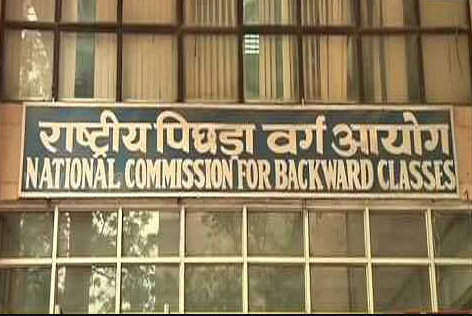The National Commission for Backward Classes (NCBC) is headless. It has no chairperson. It has no members either. The tenure of Dr Bhagwan Lal Sahni as the chairperson of the Commission ended on 27 February this year, as did the terms of Vice-chairperson Dr Lokesh Kumar Prajapati and members Kaushalendra Singh Patel, Sudha Yadav and Achary Thalloju.
 The Narendra Modi government had heavily publicized its decision to grant Constitutional status to the NCBC. The message that the government sought to send out to the OBCs was that it had strengthened the commission to protect and restore their Constitutional rights and other entitlements. Of course, all citizens have Constitutional rights but despite that the civil society has become extremely helpless and weak both in economic and social terms. Restoration of constitutional rights is not something you do on a piece of paper. It should actually strengthen the institutions and the citizens, empower them. Even if they do not appear strong, they shouldn’t at least look feeble and toothless. But the NCBC has been looking and feeling weak and helpless.
The Narendra Modi government had heavily publicized its decision to grant Constitutional status to the NCBC. The message that the government sought to send out to the OBCs was that it had strengthened the commission to protect and restore their Constitutional rights and other entitlements. Of course, all citizens have Constitutional rights but despite that the civil society has become extremely helpless and weak both in economic and social terms. Restoration of constitutional rights is not something you do on a piece of paper. It should actually strengthen the institutions and the citizens, empower them. Even if they do not appear strong, they shouldn’t at least look feeble and toothless. But the NCBC has been looking and feeling weak and helpless.
The Narendra Modi-led government has been in power since 2014. The tenures of the chairperson, the vice-chairperson and members of the commission appointed by the Congress party-led United Progressive Alliance (UPA) government it succeeded ended in 2017, and the positions remained vacant till 2019. It took the government more than two years to pick a new chairperson, a vice-chairperson and members for the body. In 2019, appointments were made in view of the impending general elections.
The appointment of the chairperson in NCBC was made on 28 February 2019. Since the reconstitution of the commission under the chairmanship of Dr Bhagwan Lal Sahni, demands were made on several different occasions for increasing the budget of the commission, providing a proper office space and increasing the number of its employees. In many of its meetings, the commission demanded that the government should give it more powers. It made pleas to this effect on many occasions to the Ministry of Social Justice and Empowered. It did have Constitutional status on paper but the other problems remained unresolved. The issues of lack of office space, budgetary constraints and shortage of employees were not addressed. There was a lot of big talk. It was said that the branches of the Commission will be established in the states. But nothing moved on the ground.

In the meantime, the terms of the chairperson, vice-chairperson and members ended. There is a provision for extending the term of the chairperson. But the problem was that Dr Sahni had built his reputation as someone who wanted to do something concrete. He wanted to make decisions and implement them. During his tenure, the NCBC wrote to all the ministries and departments seeking information on the number of OBCs in the employ of the government. The commission also interpreted its constitutional rights in its own way and tried to show that it was more powerful than how it was perceived. The commission also seemed to be on a confrontation course with the Union Home Ministry.
New appointments have not been made in the commission after the retirement of the incumbents in February. This has translated into the commission’s work coming to a standstill. It received thousands of complaints over the past three years and made attempts to resolve them speedily. The question that arises is whether the government is waiting for the run-up to the 2024 general elections? Does it want to keep appointments to the commission in abeyance till then in the hope that doing it on the eve of the elections will fetch votes?
(Translation: Amrish Herdenia; copy-editing: Anil)
Forward Press also publishes books on Bahujan issues. Forward Press Books sheds light on the widespread problems as well as the finer aspects of Bahujan (Dalit, OBC, Adivasi, Nomadic, Pasmanda) society, culture, literature and politics. Contact us for a list of FP Books’ titles and to order. Mobile: +917827427311, Email: info@forwardmagazine.in)
The titles from Forward Press Books are also available on Kindle and these e-books cost less than their print versions. Browse and buy:
The Case for Bahujan Literature
Dalit Panthers: An Authoritative History






